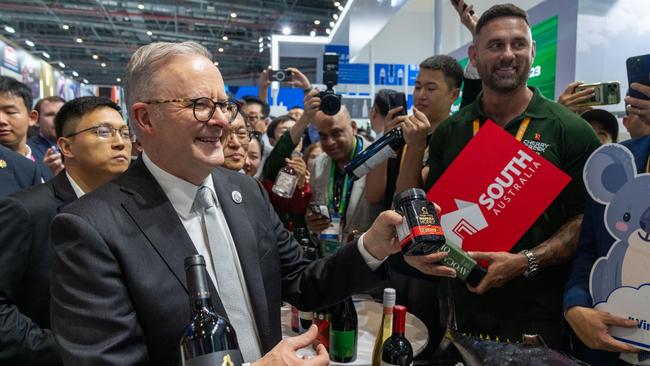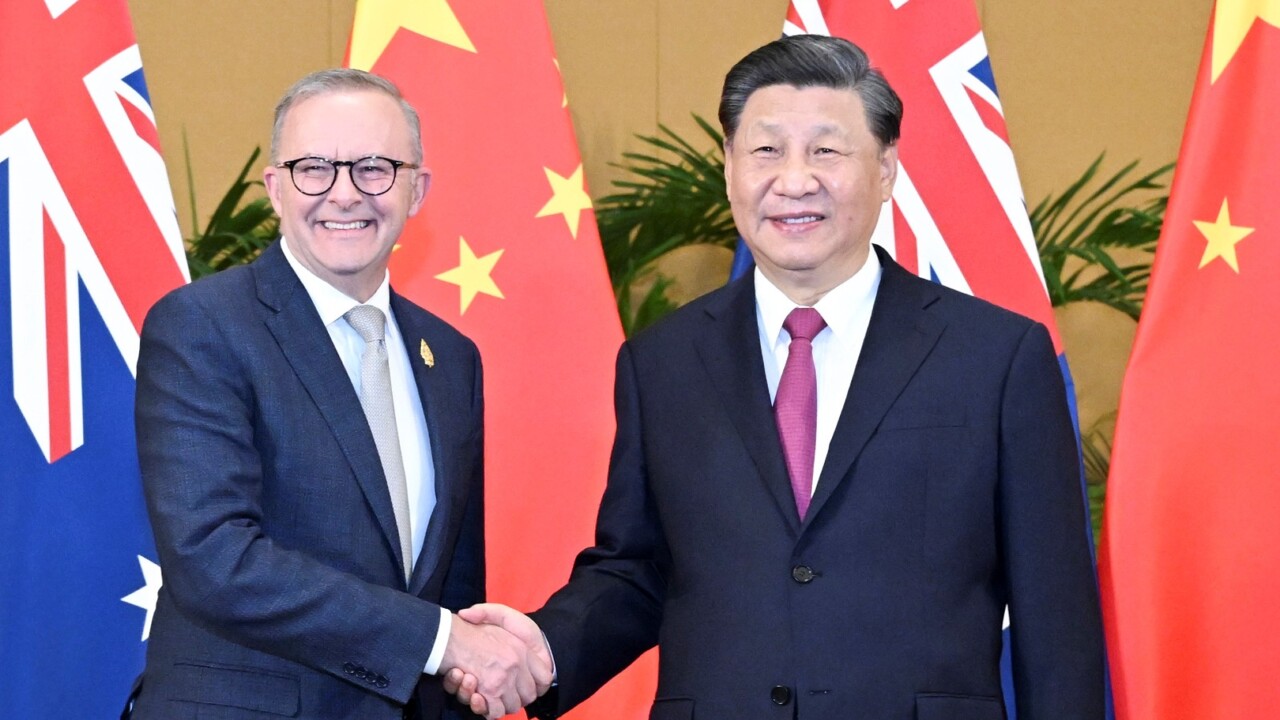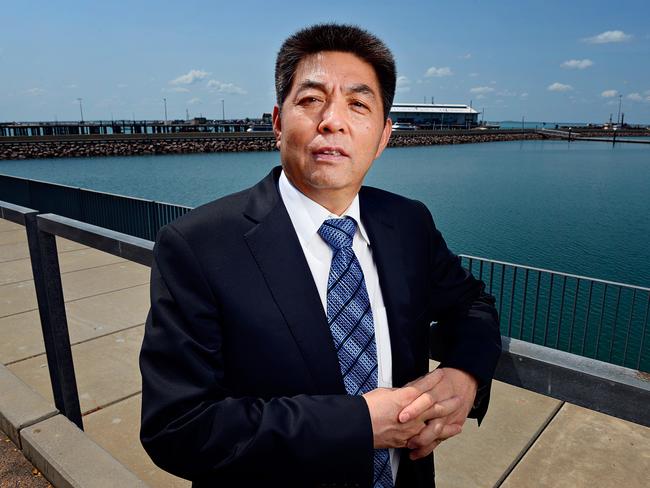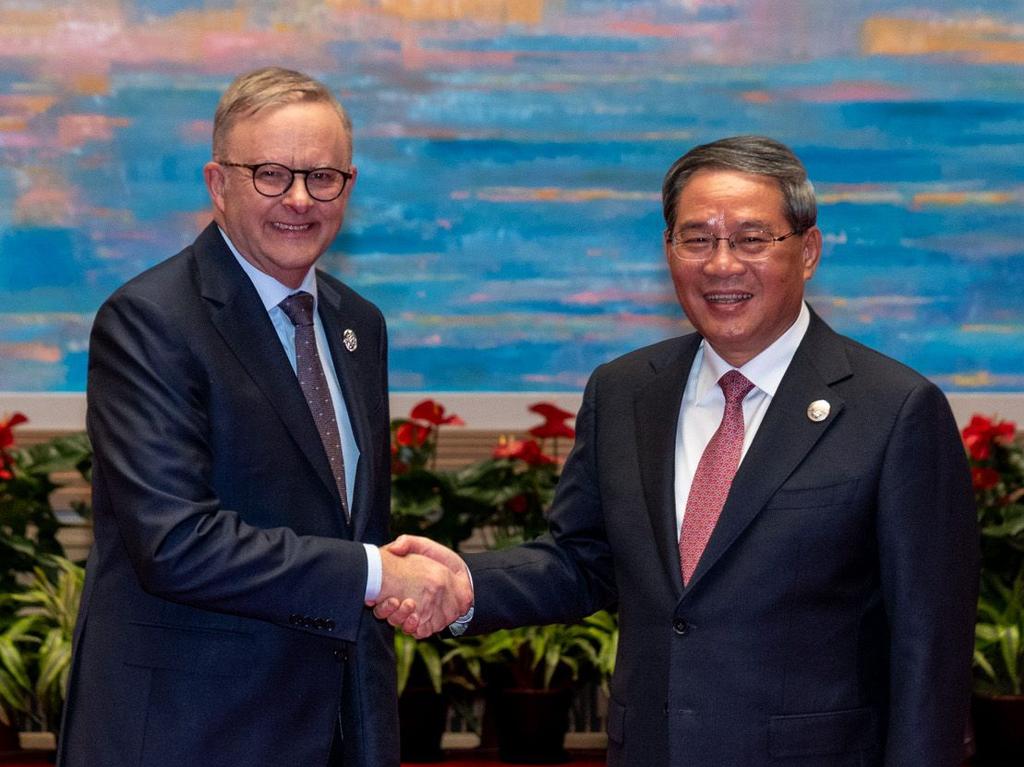Let’s toast to first port of call: a warmer relationship
The controversial Chinese billionaire leaseholder of the Port of Darwin was among the business guests in Shanghai where the mood was bullish.

The controversial Chinese billionaire leaseholder of the Port of Darwin was among the business guests in Shanghai toasting the warming of Australia’s relationship with China, which Trade Minister Don Farrell said would see the $700m lobster trade resume in a “very short space of time”.
Anthony Albanese said on Sunday that his government was still “seeking to diversify” from China, but stressed the importance of also defending ties with Australia’s biggest trade partner.
“This is a market of 1.4 billion people. This is an economy that is growing faster than the global average,” the Prime Minister said.
“And this is an economy that is complementary in many ways to the Australian economy.”
Later on Sunday afternoon, Mr Albanese was mobbed by Chinese media and store owners on a walkabout of the Australian pavilion at the China International Import Expo trade show.
The Prime Minister was earlier invited by Chinese Premier Li Qiang to speak at the opening of the politically important trade show.
“The change is unbelievable,” a senior Australian diplomat engaged in the past four dramatic years told The Australian.
In 2020, China used the same trade show to send a signal that it was out to punish the Morrison government.
In the days before that year’s expo, Australian winemakers discovered their product was not being cleared by Customs and Chinese officials blocked a $2m cargo of live Australian lobster on the Shanghai airport tarmac, marking the start of the trade’s unofficial black-listing,
In the lead-up to this expo, Australian businesses learnt many of Beijing’s trade restrictions were being lifted.

Trade Minister Don Farrell said he discussed ending the remaining restrictions on lobster and a clutch of beef abattoirs with his Chinese counterpart, Wang Wentao, over dinner on Saturday night.
“I would expect that in a very short space of time we will find those products back in the Chinese market,” Senator Farrell said on Sunday.
The Australian revealed at the weekend that the lobster industry expected the ban to end “in a matter of days”.
The senior Australian business entourage spoke bullishly about the future of relations, but many also stressed that they were adopting “China-plus” strategies to defend their exports to China while focusing on other markets.
“If you have the chance to put eggs in multiple baskets, why wouldn’t you?” Business Council of Australia chief executive Bran Black told The Australian.
Australia’s exports to China have boomed ahead of the trip, following a lithium surge, robust demand for iron ore, buoyant LNG sales and the end of Beijing’s ban on Australian coal and are on track to set a new annual report.
Former trade minister Andrew Robb was also among the Australian businesses along for the Prime Minister’s Shanghai trade event, as was Ye Cheng, the chairman of Chinese company Landbridge that owns the Port of Darwin.
Mr Robb, who worked as a consultant for Landbridge, said Mr Ye was “very happy” with the Albanese government’s pre-trip decision to allow the company to keep its controversial 99-year lease.

GrainCorp chief executive Rob Spurway said he was “delighted” by the Prime Minister’s visit, which he said would help improve the environment for Australian trade businesses.
Mr Spurway welcomed the end of Beijing’s barley tariff, but he pointed out a surge in wheat exports to China had more than offset it.
He said the improved bilateral relationship had removed a major risk for trading with China.
“Having that communication between governments, for you as a business that operates in this market, provides more confidence,” he told The Australian.
However, even as the bilateral relationship has improved, concerns for many Australian businesses based in China have risen about the state of the Chinese economy and its increasingly politicised and unpredictable regulatory environment.
A new survey by the China-Australia Chamber of Commerce found that half of its members said they were hurting because of the current state of China’s economy, which has been hit by a property slump, fall in foreign investment and decline in trade.
The survey of 91 Australian and foreign-owned companies said that worries about bilateral relations have been replaced by concern about the outlook for China’s economy and increased “politicisation” and unpredictability about the business environment in the world’s second biggest economy.
“There has been a notable shift towards a more cautious outlook compared to last year with increased concerns about uncertainty,” said the Beijing-based Chamber of Commerce.






To join the conversation, please log in. Don't have an account? Register
Join the conversation, you are commenting as Logout